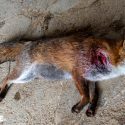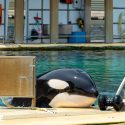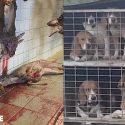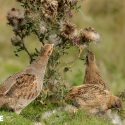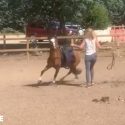Orcas at Marineland: One Voice has succeeded in having an independent expert assessment arranged!
Orcas at Marineland: One Voice has succeeded in having an independent expert assessment arranged!
21.09.2023
Alpes-Maritimes
Orcas at Marineland: One Voice has succeeded in having an independent expert assessment arranged!
Exploitation for shows
We could say that this is a victory for justice. This morning, One Voice has succeeded with what they have been asking the Aix-en-Provence Court of Appeal for: for an independent expert assessment of the state of Inouk and Moana the orcas, and of the infrastructures at the Marineland park in Antibes where they are kept along with Wikie and Keijo. A decision that we hope will allow clarity to be given on their state of health and to contribute to allowing them a life far away from shows and concrete pools.
To support our case on appeal, we have provided the courts with expert reports from Drs Ingrid Visser, Naomi Rose, and David Perpiñan, which highlight the detrimental state of health of the two oldest males in the group, accompanied by videos of the orcas and pools taken from above and by the poolside showing the potential underlying and, in the eyes of the association, outrageous problems. Inouk’s tooth pulp is damaged due to her biting at the concrete pool. According to scientists, the pain is constant.
In the first instance, the case file presented by One Voice was rejected. With these new elements, the Aix-en-Provence Court of Appeal has granted our request for an independent expert assessment to be carried out. A balanced and sensible decision that we approve of.
What future?
For us, it is now a matter of seeing what can possibly be done in terms of alternatives so that the four French orcas are not sent to a Japanese dolphinarium (or any other place where they would still be exploited). A never-ending journey for the animals that have never left the water in these pools in Antibes, with their suffering also having been linked to the effects of gravity on their organs. The fact that they would be separated is also detrimental to their balance given that these four orcas form a real family, the only one in captivity that we know of. Yet, in the wild, orcas spend their whole lives with their families. A few days ago, One Voice also published a report on Wikie, the female and matriarch of the group, whose health also concerns us. We have written to the Japanese authorities about her.
For years, we have also been working on supporting and implementing alternative solutions to those set out by Parques Reunidos (owner of Marineland Antibes) with all of our partners on a European and global level. The solution of a sanctuary would require Marineland to accept our helping hand and work with us on mutual understanding for the future of these orcas. Until now, the park has refused to speak or respond to anyone from One Voice.
The ‘animal protection’ law of 2021 plans for orcas to be sent to a marine sanctuary, with our structure being under construction. However, the Ministry of Ecology seems to be doing everything they can to get rid of the animals before making clear decrees. In the orcas’ case, as for circus elephants, this law is worse than a status quo.
Our determination to find a better life for Inouk, Moana, Wikie, and Keijo is unfailing. Sign our petition!
Translated from the French by Joely Justice

